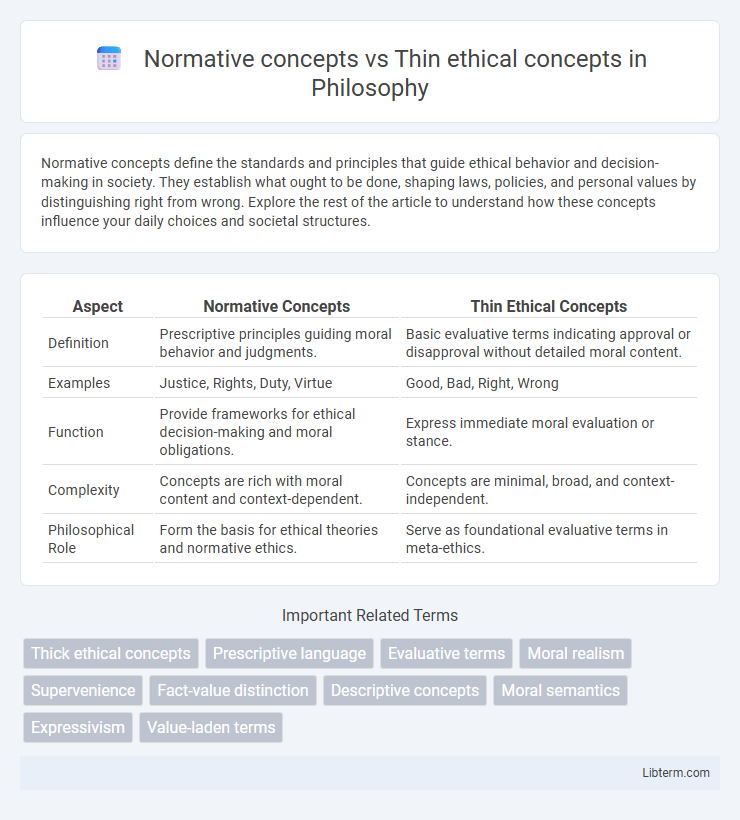Normative concepts define the standards and principles that guide ethical behavior and decision-making in society. They establish what ought to be done, shaping laws, policies, and personal values by distinguishing right from wrong. Explore the rest of the article to understand how these concepts influence your daily choices and societal structures.
Table of Comparison
| Aspect | Normative Concepts | Thin Ethical Concepts |
|---|---|---|
| Definition | Prescriptive principles guiding moral behavior and judgments. | Basic evaluative terms indicating approval or disapproval without detailed moral content. |
| Examples | Justice, Rights, Duty, Virtue | Good, Bad, Right, Wrong |
| Function | Provide frameworks for ethical decision-making and moral obligations. | Express immediate moral evaluation or stance. |
| Complexity | Concepts are rich with moral content and context-dependent. | Concepts are minimal, broad, and context-independent. |
| Philosophical Role | Form the basis for ethical theories and normative ethics. | Serve as foundational evaluative terms in meta-ethics. |
Introduction to Normative and Thin Ethical Concepts
Normative concepts such as justice, rights, and duties establish standards that guide moral judgments and prescribe how individuals ought to behave within society. Thin ethical concepts like good, bad, right, and wrong provide basic evaluative assessments without specifying detailed norms or rules. Understanding the distinction between these helps clarify the structure of ethical arguments and the foundational criteria for moral reasoning.
Defining Normative Concepts
Normative concepts establish standards for evaluating actions, intentions, or character traits based on moral principles, such as justice, duty, or rights. These concepts provide a framework for determining what is morally obligatory, permissible, or forbidden, shaping ethical decision-making processes. Unlike thin ethical concepts like "good" or "bad," normative concepts carry richer evaluative content and guide practical reasoning in moral philosophy.
Understanding Thin Ethical Concepts
Thin ethical concepts, such as "good," "bad," "right," and "wrong," encapsulate basic evaluative meanings with minimal descriptive content, serving as foundational tools for moral judgment. These concepts are distinct from normative concepts because they express immediate moral evaluations without prescribing specific rules or actions. Understanding thin ethical concepts is crucial for analyzing how moral language conveys approval or disapproval in a concise and universally accessible manner.
Key Differences Between Normative and Thin Ethical Concepts
Normative concepts provide prescriptive guidelines that outline what individuals ought to do, encompassing broad ethical principles such as justice, rights, and duties. Thin ethical concepts, by contrast, offer evaluative judgments with minimal descriptive content, like "good," "bad," "right," or "wrong," serving as foundational elements in moral reasoning without detailed normative directives. The key difference lies in normative concepts' comprehensive role in guiding ethical actions, whereas thin ethical concepts function primarily as basic evaluative terms underpinning moral discourse.
Historical Development of Ethical Terminology
Normative concepts, rooted in prescriptive judgments about how individuals ought to behave, evolved alongside moral philosophy since antiquity, reflecting ideal standards like justice and virtue. Thin ethical concepts, such as "good" or "bad," emerged as basic evaluative terms serving as foundational elements in moral discourse and were extensively analyzed by early modern philosophers like Hume and Kant. The historical development of ethical terminology showcases a progression from broad evaluative language to refined normative frameworks central to contemporary moral theory.
Philosophical Significance of Normative Concepts
Normative concepts, such as "ought," "right," and "duty," carry inherent evaluative force that guides moral judgment and action, distinguishing them from thin ethical concepts like "good" or "bad" that primarily describe without prescriptive weight. Their philosophical significance lies in structuring frameworks for ethical reasoning, enabling objective assessment of behavior beyond mere description. By embedding obligation and normativity within language, normative concepts facilitate rigorous discourse on morality, justice, and moral responsibility in ethical theory and practice.
The Role of Thin Concepts in Moral Discourse
Thin ethical concepts such as 'good,' 'bad,' 'right,' and 'wrong' play a crucial role in moral discourse by providing fundamental evaluative tools that guide ethical judgments without extensive descriptive content. These concepts are semantically minimal yet normatively potent, enabling individuals to express approval or disapproval directly in moral contexts. Unlike broader normative concepts, thin concepts facilitate clear, concise communication of moral sentiments and are essential for the practical functioning of ethical language.
Examples of Normative vs Thin Ethical Concepts
Normative concepts include principles like justice, rights, and duties, which provide comprehensive guidelines for evaluating actions and social contexts. Thin ethical concepts, such as good, bad, right, and wrong, offer minimal evaluative meaning and are often used to express basic moral judgments without detailed justification. For example, "justice" as a normative concept involves complex criteria and societal standards, whereas "good" as a thin ethical concept simply indicates a positive evaluation without specifying why.
Implications for Ethical Theory and Practice
Normative concepts guide moral judgments by providing standards for right and wrong, whereas thin ethical concepts like "good" or "bad" express evaluative attitudes without detailed criteria. This distinction impacts ethical theory by emphasizing clarity in moral reasoning and avoiding ambiguity in ethical discourse. In practice, understanding the difference helps practitioners apply objective norms while recognizing subjective evaluative expressions in ethical decision-making.
Conclusion: Bridging Normative and Thin Concepts in Ethics
Bridging normative concepts and thin ethical concepts enhances ethical analysis by integrating broad moral principles with context-sensitive judgments. This approach fosters a more precise and applicable ethics framework, facilitating nuanced decision-making in complex situations. Emphasizing their interplay supports deeper understanding and practical application of ethical theory across diverse contexts.
Normative concepts Infographic

 libterm.com
libterm.com